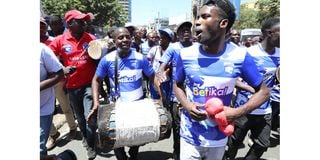Why it’s tough for community clubs

A section of AFC Leopards fans head to the Nyayo National Stadium for their Football Kenya Federation Premier League match against Gor Mahia on January 29, 2023.
What you need to know:
- The player mostly shall be useless to the club and is soon sold, then the court and Fifa cases begin and the club gets suspended from buying any players until it settles its dues.
- K’Ogalo is just an example. These “virus” masquerading as human beings needs to be vaccinated out of the system for any good thing to happen.
A fortnight ago, in this same column, we gave some opinion on how to weed out clubs that are financially incapable from the Football Kenya Federation Premier League.
We have since learned that, if we put the financial requirement on the clubs, we shall remain with a skeleton of a league. Those that will remain in the league — nine teams — are mainly sponsored by companies and government departments.
Ironically, these corporate teams have very few supporters and their matches with each other attract the fewest fans. On the other hand, the community clubs have a legion of fans rooting for them.
However, they are suffer from economic difficulties that make it hard to honour their matches and pay the players’ salaries.
The main issue is lack of sponsors, an issue that we have harped on for too long and still hope that it shall be done.
To run a community team without sponsorship is a headache that only those that do it can tell you. There are four main priorities and these are; to pay the players’ salaries, cover match expenses— transport and allowances—pay training ground expenditure, fork out cash for office maintenance and a club house if the team has one.
This may look easy, but in practice, the priorities must be put in another upside down order.
The players must play the matches and thus honouring fixtures must be a primal priority because without doing that, the team shall be relegated after missing three matches. To honour the matches, they must train and be fit for their games.
This means that, the salaries shall take the backbench with office expenses coming last.
For some of the community teams that are still staying afloat, and we do not hear about their players whining and rushing to court for not being paid, the management makes sure the players and coaches know the problem and the entire cash flow of the club is explained to them.
They get an internal glimpse of the financial breakdown of the club and participate in the decision making on how and when they shall get paid. It works for them rather smoothly.
Whenever you hear that a team has been taken to Fifa for arbitration about salary issues, it is never always an easy issue. Teams have “their own bacteria within”; a posse whose main inclination is to eat from the club and their stomachs become the main priority!
These “fabulous” people’s conscience thrives well in the Kenyan climate. They sniff out some foreign players, clamp them into a club like Gor Mahia for example, get him signed with a hefty salary compared to the local players and they are forced to share the little money that is available.
The player mostly shall be useless to the club and is soon sold, then the court and Fifa cases begin and the club gets suspended from buying any players until it settles its dues.
K’Ogalo is just an example. These “virus” masquerading as human beings needs to be vaccinated out of the system for any good thing to happen.




